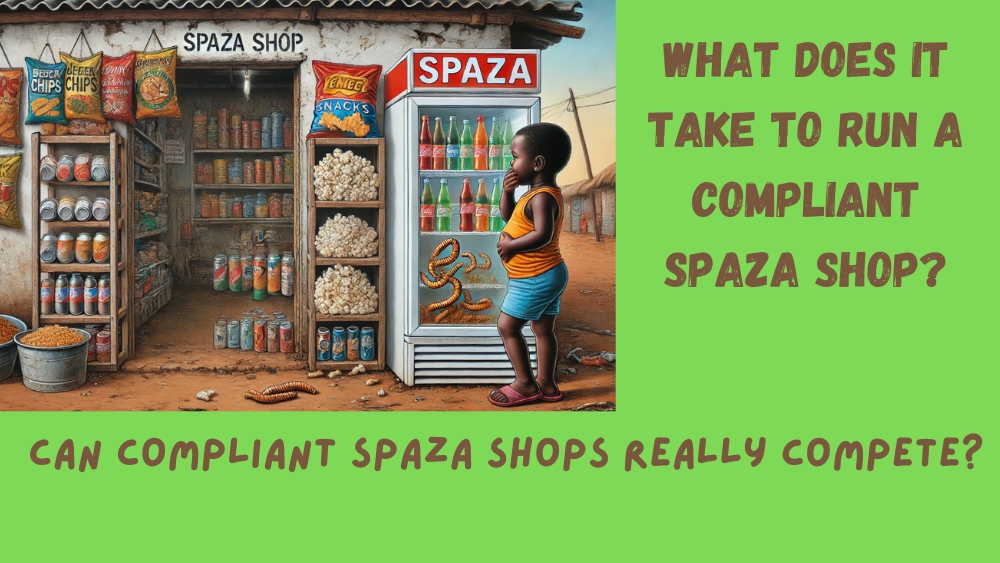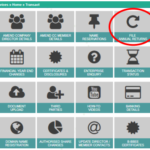
The rise in food poisoning cases among school children has sparked urgent discussions about compliant spaza shops in South Africa. Many are calling on the government to take stronger action as the number of related fatalities continues to climb. However, compliance can be costly, and many small businesses in townships, under pressure to keep prices low, may be tempted to cut corners. This article explores the essential steps needed to run compliant spaza shops and shows how compliant spaza shops will struggle to be price competitive against their non-competitors.
What is a Spaza Shop?
A spaza shop is a small retail business, often run from home and serving township communities in South Africa. These micro-enterprises are vital to the local economy and provide essential goods to neighbourhood customers. Spaza shops generally need to be registered with local municipalities to facilitate their compliance to a number of regulations, including food safety. Local municipalities differ in terms of the requirements for registration and it is important that anyone interested in starting a business receive a full checklist from the municipality.

Registration and licensing for Spaza
Business Registration
As with any business, it is best to get formally registered, especially if the business will look to accessing additional support from Enterprise and Supplier Development programmes, SEDA, SEFA, etc. For example SEDA’s “Spaza-Shop Support Programme” requires that the spaza shop be owner-managed, have a valid South African identification document, formally registered, employing 70% South Africans and already in possession of a municipal trading license.
We have discussed governance and the merits of registering in this article, and have also provided in this article some basic guidelines around maintaining compliance for businesses in general.
In the context of compliance for spaza shops, business registration entails:
- Completing an application form at the CIPC;
- Supplying identification and proof of address; and
- Paying applicable fees, around R175..
Many municipalities insist that spaza shops get formally registered, and this requirement alone already provides an additional regulatory step. This is because the spaza shop entity and its owners will be known, and they will automatically be registered for tax as per CIPC processes.
Municipal Spaza Shop Permits
To be licensed to run a spaza shop, the business needs to obtain a municipal trading license that requires:
- Properly zoned premises;
- Health certificates that confirm that health regulations are adhered to; and
- For premises that will sell food – food service regulations must also be adhered to as detailed below.
Food Safety Compliance
Selling food, including light snacks, packaged food, bread and baked goods, fresh produce, cold beverages, dairy, etc., comes with additional compliance requirements some which are covered under the municipal Certificate of Acceptability (COA). This is a compliance certificate that is developed and regulated under the auspices of the Department of Health through Regulation R638- “Regulations Governing General Hygiene Requirements for Food Premises, the Transport of Food and Related Matters”. Included in this standard are guidelines such as refrigeration, freezing, use of thermometer, storage, handwashing facilities, training, traceability and record-keeping. Municipal health inspectors conduct inspections and provide the results that municipalities use to issue the COA.
Other additional requirements, even for spaza shops that do not need the COA, include proper management of premises in terms of pest control measures, fire protection, emergency management, separation of commodities (chemicals separate from food) etc.
Other governance requirements form spaza shops
A spaza shop that employs people must also abide to safety as well as employee laws and regulations, amongst others:
- OSHA Occupational Health and Safety Act;
- PAYE and UIF rules and regulations;
- Employee contracts, working hours and the management of overtime.
Opportunities for South African retailers
Spaza shop retailers are not manufacturers, but they have control over the items they can retail. Spaza shops must include products from local manufacturers on the basis that they know them intimately and where issues of quality arise, they will have access to the source and can fix then with minimal negative effect on the customers they serve.
Can compliant spaza shops compete against non-compliant competitors?
The need to have rules and regulations to guide spaza shops, especially those that prepare and sell food, is not under debate. The regulations have been developed primarily to protect the South African consumer. But with limited enforcement of laws and by-laws by regulators, the South African consumer is increasingly subjected to low quality products, and in extreme cases, poisonous food and snacks that have unfortunately resulted in fatalities.
Essentially poor people are left to decide for themselves where and what products they can purchase, and with limited financial resources, they naturally opt for the cheapest goods and food items they can find. Unfortunately, what presents as cheap in the eye of the consumer is generally low in quality and in compliance.
The difference between compliant spaza shops and their non-compliant competitors explains the significant difference in the pricing of their respective offerings. In summary, non-compliant business:
- Are not registered at the CIPC and therefore it is not known who owns them and who their beneficial owners are. That means that they could be funded by illicit funds. Anyone who is funding their business from their own pocket, or from their pension fund, could be competing with businesses that are funded from fairly “unlimited” and illicit sources.
- Do not lodge annual returns at CIPC so it will never be known whether they have reached the average R2800 of revenue a day to be compelled to register for VAT;
- Are not licenced at the municipality; that means they have no pressure to meet any specific regulations at inception, and they do not need to comply to regulations such as health and product traceability, on an ongoing basis;
- Can source any product from anywhere without pressure to check whether the product quality could compromise their ability to maintain their COA licence;
- Will never get a visit from environmental health officers for an inspection because they are not licenced. Only legally operating spazas shops are visited, and this is the mostly what licenced spaza shops complain about;
- Can employ slave labour and pay close to nothing for in-store assistance. Owner operators need at least one person inside the spaza shop while they source products, meet suppliers, financiers, regulators, etc. Furthermore, non-compliant spaza shops can open for more than 12 hours without incurring any additional labour costs while compliant spaza shops have no such luxury.
In a way this article presents a different angle to the recent study by the Sustainable Livelihoods Foundation that concludes that South African owned spaza shops are less competitive for various reasons, including:
- Ownership dynamics where owner/operators are full time and employ additional labour;
- Supply chain innovation where groups pull their resources and purchasing power to unlock discounts;
- Long hours of operations with flexible labour that double as security at night;
- Diversified products where some spaza shops also sell alcohol, for example; and
- Initial capital outlay where foreign owners invest at much as 15 times what local spaza owners put up as capital.
But this article from eNCA supports the point we are trying to drive across. In the article, one spaza shop owner explained: “Inspectors called me out because of the excess stock I had in my shop that was almost nearing its expiry date. But when I asked if they had visited other spaza shops, they told me that the law does not allow them to. I ended up reducing my stock and relied on the Lotto machine for income instead,” In the same article, another spaza owner explains that by-laws governing the handling of food products, including monitoring stock levels and expiry dates, had taken a back seat and that she doubted that newly established spaza shops adhere to these rules. Newly established spaza shops would include mostly the ones being set up by foreign national given that local owners are exiting this market.
Conclusion
Our view is that the lack of competitive pricing in spaza shops has a lot to do with the degree to which spaza shops are regulatory compliant. The South African consumer is now paying dearly for the general lack of enforcement and the conditions that saw compliant spaza shops being driven out of the township economy. Spaza shops run by local entrepreneurs need capital and support, but they must comply to applicable laws and regulations first, in order to access this capital. Thereafter they must face competitors that do not need to comply to any laws. They must compete against a competitor that uses business premises as factory, shopfront, bedroom, bathroom, and that pays close to nothing for labour.
In future, it may be necessary to review the compliance landscape for spaza shops with a view to relax the regulatory burden without compromising the quality of food sold to the consumer. The regulations should apply to all spaza shops and with a level playing field, the true competitive pricing that will emerge will not be at the cost of lives.
Further Reading
For other guides and articles on governance, please refer to this section of our site.



